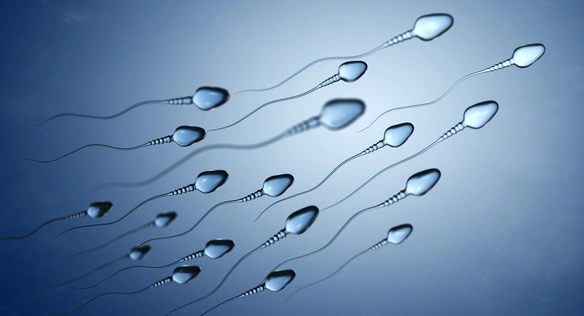The sample is provided at our clinic in privacy. Between 2 and 4 days of sexual abstinence is recommended.
Sperm freezing
Preserve your male fertility

Sperm freezing is a safe and effective technique that allows sperm to be preserved for future use. It is indicated for both medical and personal reasons and enables fatherhood to be planned with peace of mind.
At Fertility Madrid, we help you preserve your fertility in a simple, confidential way with personalised care.
What does sperm freezing involve?
Sperm freezing, also called seminal cryopreservation, consists of preserving sperm in liquid nitrogen at -196°C. This process allows their viability to be maintained for years, making their later use possible in assisted reproduction treatments such as IVF or insemination.
Why freeze sperm?
The main reasons for undergoing this treatment are:

- Starting aggressive medical treatments (chemotherapy, radiotherapy)
- Progressive loss of sperm quality
- Before a vasectomy
- Difficulty obtaining the sample on the day of treatment
- Gender transition
Who can benefit from this technique?
Sperm freezing is recommended for:
- Men with diseases affecting fertility
- Elite athletes or those with frequent testicular injuries
- People planning fatherhood later in life
- Men undergoing hormonal or surgical treatments
- Oncology patients
What is the step-by-step process?
Preliminary blood test
Before cryopreservation, we carry out blood tests for HIV, Hepatitis B and C, and syphilis.
Sample collection
Semen quality analysis
A semen analysis is performed to assess concentration, motility, morphology, and vitality.
Addition of cryoprotectants
These prevent the water in the sperm from damaging the cells during the freezing process.
Freezing and storage
The samples are stored in cryotubes, identified, and preserved in liquid nitrogen.
What is the cost of sperm freezing?

Price: from €250
- Includes vitrification for 1 year (5 cryotubes or straws).
Additional straws: from €180
Storage from the second year onwards: €300/year
Frequently asked questions about sperm freezing
What are the success rates of sperm freezing?
The success rates of sperm freezing can vary depending on factors such as the man’s age and the quality of the sperm at the time of freezing. Sperm quality, including aspects like motility and sperm count, influences the results of subsequent assisted reproduction treatments. To obtain an accurate estimate of success rates, it is important to carry out a sperm quality analysis in a specialised consultation. This analysis helps determine the viability of the frozen sperm and how it fits the needs of future fertility treatments.
How long can frozen sperm be preserved?
Indefinitely, as long as it is kept under proper liquid nitrogen conditions.
Does freezing affect sperm quality?
Most sperm survive the process in a viable way. However, it depends on the initial quality.
Can I freeze sperm if I have a low sperm count?
Yes, but it may be necessary to consider several collections.
What are the risks of sperm freezing?
There are no associated risks.